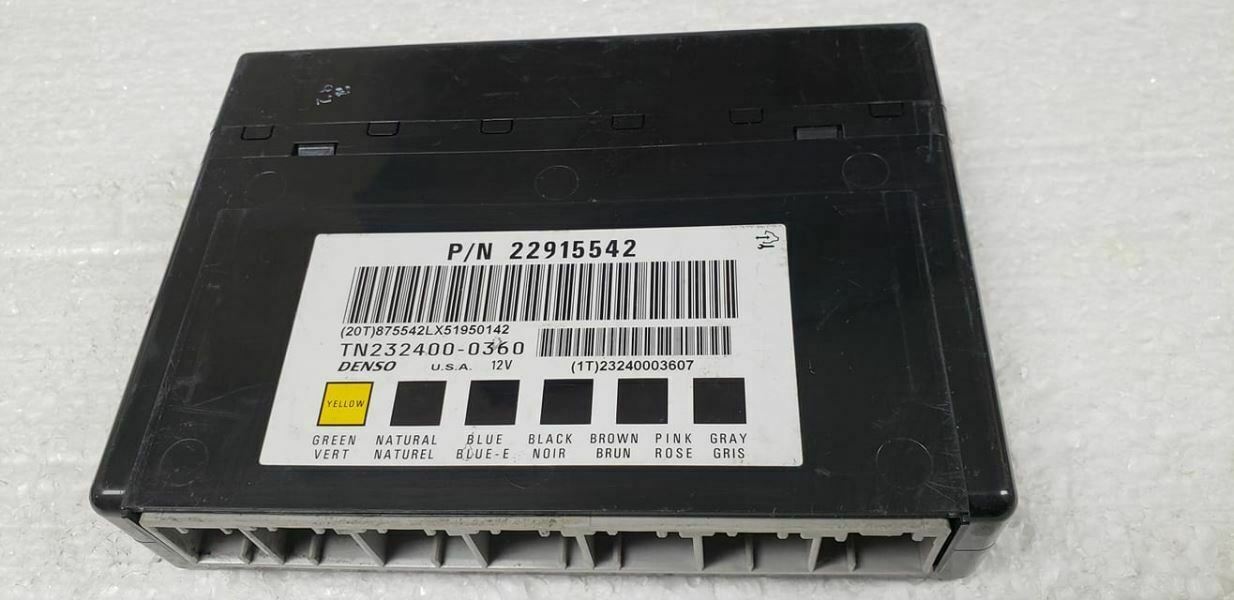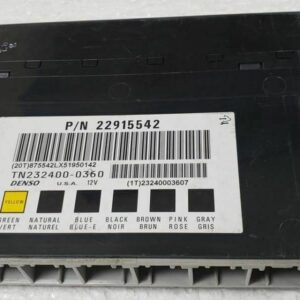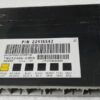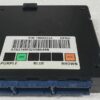Tired of Unpredictable Electrical Gremlins in Your GM Vehicle?
As a technician with over two decades of experience, I’ve seen firsthand how a failing Body Control Module (BCM) can turn a reliable vehicle into a source of constant frustration. Are your interior lights flickering for no reason? Do your power windows or door locks have a mind of their own? Is your vehicle’s security system preventing it from starting? These aren’t just annoyances; they’re classic signs that the central command center for your vehicle’s electronics—the BCM—is failing. This isn’t a part you can ignore, as it governs dozens of crucial functions that you rely on every day.
This isn’t just a replacement part; it’s a complete, ready-to-install solution. We take the guesswork and high dealership costs out of the equation. By providing your Vehicle Identification Number (VIN) at checkout, you receive a Programmed GM BCM that is flashed with the latest GM software specific to your car, truck, or van. This means it arrives ready to be installed, restoring full functionality without the need for an expensive trip to the dealer for programming.
A Technician’s Notebook: The Case of the Haunted Traverse
A customer brought in a 2014 Chevy Traverse with a list of bizarre symptoms: the radio would randomly shut off, the dome lights would flicker while driving, and occasionally the liftgate wouldn’t open. They’d already replaced the battery and checked the main grounds. Diagnostics showed intermittent communication loss codes (U0140) with the BCM. Instead of a complex wiring issue, my experience pointed straight to the BCM itself. Internal circuit board failures on these modules are common. We installed a VIN-programmed BCM like this one, and in under an hour, every single electrical issue was resolved. It’s a prime example of how this single component can fix a dozen problems at once.
Is Your Vehicle Showing These Telltale BCM Failure Symptoms?
- ✔ Erratic or non-functional power windows, door locks, and mirrors.
- ✔ Flickering or inoperative interior and exterior lights.
- ✔ Malfunctioning windshield wipers that won’t turn on or off.
- ✔ A security or anti-theft system light that stays on, often causing a no-start condition.
- ✔ False warning messages on the driver information center (DIC).
- ✔ Diagnostic trouble codes (DTCs) related to communication, such as U0140, U0155, or B1001.
- ✔ Inconsistent horn or remote keyless entry operation.
Your Straightforward BCM Installation Guide
Replacing the BCM is a manageable task for a confident DIYer. Our pre-programming service handles the most complex part, leaving you with the physical installation.
- Safety First: Always disconnect the negative terminal from your vehicle’s battery and wait a few minutes for the system capacitors to discharge.
- Locate the BCM: On most supported models (like the Acadia, Traverse, and Impala), the BCM is located on the driver’s side, under the dashboard to the left of the steering column. On Savana and Express vans, it’s typically found in the center dash area.
- Remove Connectors: Carefully unplug all electrical connectors from the old BCM. They have locking tabs that need to be depressed. Do not force them.
- Swap the Module: Unbolt or unclip the old BCM from its mounting bracket and remove it. Install the new module in its place.
- Reconnect Everything: Plug all electrical connectors securely into your new Programmed GM BCM. Reconnect the negative battery terminal.
- Perform Post-Install Checks: Start the vehicle and test all body functions—lights, locks, windows, wipers, etc. Note the post-installation procedures below, as some relearns may be necessary.
Important Post-Installation Information
While our VIN programming handles the core setup, certain vehicle systems may require a ‘handshake’ with the new BCM. Please be aware of the following potential procedures:
- Airbag System Sync: If your airbag warning light is illuminated after installation, a professional scan tool is needed to perform the “Setup SDM Primary Key in BCM” procedure. This syncs the new BCM with the airbag module.
- Brake Pedal Position Relearn: On some models, a brake pedal position sensor relearn may be required to ensure correct brake light and stability control operation.
- No Core Charge: You are not required to return your old BCM. There is no core charge or deposit associated with this purchase.
Disclaimer: Vehicle systems vary. Always have a factory service manual available for your specific model for detailed instructions and torque specs.
Verified Vehicle Compatibility
This module, part number 22915542 (also replaces 22820314), is a direct-fit solution for a wide range of GM vehicles. Please match your vehicle and options below to confirm fitment:
- Acadia: 2013-2016, 2017 (Limited VIN J)
- Captiva Sport: 2013-2015
- CTS: 2014 (SW, V-Series Sdn), 2014-2015 (Cpe)
- Enclave: 2013-2017
- Express Van (1500/2500/3500): 2013-2018
- Impala: 2013, 2014-2016 (Limited VIN W)
- Savana Van (1500/2500/3500): 2013-2018
- Traverse: 2013-2017
Frequently Asked Questions
Why do you need my VIN?
Your VIN is essential. It allows our technicians to flash the BCM with the exact software and vehicle-specific options (like keyless entry, lighting packages, etc.) that your vehicle was built with. This ensures a seamless, plug-and-play installation without needing a dealer.
Is this a plug-and-play part?
For most functions, yes. Because we program it to your VIN, the core systems will work upon installation. However, as noted, some subsystems like the airbag or brake position sensor may require a simple relearn procedure with a compatible scan tool.
Do I need to return my old BCM?
No. We do not require you to send back your original module. There is no core charge or any hidden fees.
Will this fix my ‘Service Theft Deterrent System’ message?
A failing BCM is a very common cause of this message and a related no-start condition. While other issues can cause it, if you’ve also experienced other electrical problems, replacing the BCM is the most likely solution.
What tools are needed for the post-install relearn procedures?
The Airbag System Sync and Brake Pedal Position Relearn require a bi-directional professional diagnostic scan tool (such as a GM Tech 2, MDI, or high-end aftermarket scanner). Most basic code readers cannot perform these functions.



